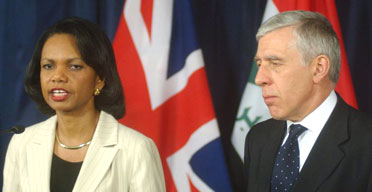
最近美國國務卿萊斯訪問英國外相Jack Straw的選區,在曼城北方的小城Blackburn,(他曾任同選區勞工黨名人Barbara Castle的助理,她自1945-1979為本選區國會議員;Straw於1979接棒),並在當地足球場發表演講。隨後兩人又連袂搭機到伊拉克,而發生萊斯將床讓給Straw,她自己睡地板的「醜聞」。每日電訊報的記者還逮到Straw在介紹萊斯時,誤把她名字的暱稱Condi唸成condom…英國記者對Straw與萊斯的關係有很多綺想…有篇報導(可不是小報),把Straw帶萊斯到Blackburn訪問的心情,描述為介於宋楚瑜帶「坦克」回家,與五年級小男生看待班上最聰明漂亮女生之間…
名美國政治評論家Beaver在他的網頁上轉貼了陸以正大使的一篇文章:
https://city.udn.com/v1/blog/article/article.jsp?uid=allthingsconsidered&f_ART_ID=226631
但自從美國在伊拉克陷入泥淖,逐漸變成全球伊斯蘭信徒的公敵後,有識之士感覺過去一面倒支持以色列的政策,已到非改變不可的時候了。一星期前,芝加哥大學講座教授米夏摩(John J. Mearsheimer)和哈佛大學甘迺迪政治學院講座教授華爾特(Stephen M. Walt),借英國有名的《倫敦書評雜誌(London Review of Books)》發表一篇長達卅六頁的文章,題目就叫「以色列遊說團(The
大使有點搞顛倒了,該文在甘迺迪學院的網頁上先出現,然後才在倫敦書評上出現(而且倫敦書評一期也才30多頁些,不可能一篇文章就這麼長),文章刊出後引起軒然大波,包括馬里蘭大學歷史系Jeffrey Herf與密西根大學政治系教授Andrei Markovits等人投書抗議,有憤怒讀者更要退訂該雜誌
(該文連結可見http://mearsheimer.uchicago.edu/recent.html),新保國關學者、約翰霍普金斯大學高等國際研究院Eliot Cohen教授在華盛頓郵報上撰文稱該文的確是反猶太人的http://www.washingtonpost.com/wp-dyn/content/article/2006/04/04/AR2006040401282.html
猶太裔大左派杭士基(Noam Chomsky)撰文為以色列喊冤
http://www.zmag.org/content/showarticle.cfm?ItemID=9999
福山在華盛頓郵報上受訪時則稱以色列遊說團絕非攻伊唯一因素
http://www.washingtonpost.com/wp-dyn/content/discussion/2006/03/16/DI2006031601228.html
We think we're special, but she is seeing someone else
By Niall Ferguson
On arriving at Liverpool's John Lennon Airport on Friday (no doubt humming Love Me Do), the US Secretary of State, Condoleezza Rice, was greeted with roughly equal quantities of bouquets and brick-bats. Local dignitaries mumbled the familiar old saws about the Anglo-American "special relationship". The anti-war rent-a-mob stood on the sidelines chanting their equally threadbare slogans. Snore.
More interesting by far was the criticism of the
Previous Labour Prime Ministers have been at best ambivalent towards Uncle Sam. Clement Attlee opposed the idea of using atomic weapons to win the Korean War. Harold Wilson refused to involve
But Mr Blair has more or less uncritically supported successive
In return for what? Last Thursday, as Alan Johnson pointed out, the US Senate voted to tighten the laws governing foreign investments in American companies, on the ground that they might allow terrorists or hostile governments to acquire information prejudicial to national security. The proposed reforms of the Committee on Foreign Investments will hit
Not only is it economically foolish for Congress to make it harder for foreigners to invest in
To judge by opinion polls, Alan Johnson is not alone in feeling fed up with what he bluntly termed American "hypocrisy". On the eve of George W Bush's presidency, 83 per cent of British voters had a favourable opinion of the
Should Dr Rice be worried by such polls? The conventional wisdom among experts on international relations is that she should. Yet I am not so sure. For one thing, these surveys don't go back very far. The late 1990s, when they start, may well have been a high-water mark for Anglo-American amity.
In 1999 everyone but a few mavericks and malcontents was happy: the indestructibly charming Bill Clinton and the squeaky-clean Mr Blair had just terminated the late Slobodan Milosevic's policy of ethnic cleansing in Kosovo. The Right cheered because they had come to loathe Milosevic during the Bosnian war. The Left cheered because they saw humanitarian intervention as legitimate.
I suspect that the 1980s were much more like the early 2000s. Now that the American media have all but beatified him, it is easy to forget that Ronald Reagan was once portrayed by British cartoonists with just as much contempt as George W Bush is today. The image of the pea-brained cowboy has lost none of its appeal to insular British Left-wingers, who flatter themselves that they are smarter and more sophisticated than the
No, Condi can relax; we have been here before. The special relationship is, in any case, a British illusion. True, for a majority of prime ministers since Churchill, it has made good sense to pose as the best friend of the world's pre-eminent power. But for US presidents there has never been a commensurate benefit in singling out
The more the
The key for a superpower is to have many special relationships, not one. There was a great rumpus at Harvard last week following the publication of a working paper, co-authored by Stephen Walt of the Kennedy School of Government, which criticises the power of the "Israel Lobby" in
A central difficulty of American policy in the
Nor are those
Once upon a time, the Bush administration's foreign policy was easy. There were three bad guys - the "axis of evil"'. Everyone else was either willing or unwilling to join the posse to round them up. Things have got more complicated since the Bushies rediscovered diplomacy. In place of three enemies, Condi now finds herself managing multiple friends, most of whom labour under the delusion that their relationship with the
The trouble is that none of this peregrination can alter the political arithmetic of the UN Security Council, all five permanent members of which need to agree before action can credibly be taken in the name of the "international community". That unanimity was not forthcoming for the war against Saddam. It is equally unlikely to be forthcoming for sanctions against
So Condi can sing Love Me Do to all the special friends she cares to visit. Until she squares that not so friendly trio, her globetrotting diplomacy will be little more than a Magical Mystery Tour.
· Niall Ferguson is Laurence A. Tisch Professor of History at
Ferguson認為Mearsheimer和Walt大可指著這波批評怒濤,說「這正證明了我的觀點」!原籍英國的Ferguson還擔心英國在美國眼中沒那麼重要,但從萊斯和Straw能搭一架連袂訪伊拉克來看,陸大使說英國對美國的遊說最有效,大概比較接近真實,「血濃於水」…







